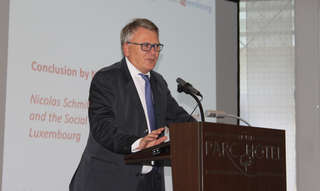The second day of the event 'Digital Economy Conference: Let’s be ready for the new jobs!' organised by the Ministry of Labour, Employment and the Social and Solidarity Economy, in cooperation with the European Commission, was held in Luxembourg on 11 November 2015. On this occasion, the panel of experts was asked to discuss investment in human capital to deal with the ongoing digital revolution. The Minister for Labour, Employment and the Social and Solidarity Economy, Nicolas Schmit, concluded the conference by calling for reflection on 'anew digital deal'.
The Minister for National Education, Higher Education and Research, Claude Meisch, as well as five experts, participated in the discussion: Renate Hornung-Draus, President of the Social Affairs Committee of BUSINESSEUROPE; Peter Scherrer, Deputy Secretary-General of the European Trade Union Confederation (ETUC); Ana Carla Pereira, Head of the 'Skills and Qualifications' Unit of the European Commission's DG for Employment; Alexander Riedl, Head of Unit at DG CONNECT and Annamaria Leuzzi, Head of the management body for the European Social Fund (ESF) in Italy.
The importance of education and public infrastructure in the development of digital skills of individuals
 Based on the fact that in 2020, 90% of jobs will have a digital component, whereas today, most individuals do not have sufficiently developed skills in this area, the speakers agreed on the need to strengthen the digital skills of individuals.
Based on the fact that in 2020, 90% of jobs will have a digital component, whereas today, most individuals do not have sufficiently developed skills in this area, the speakers agreed on the need to strengthen the digital skills of individuals.
Claude Meisch expressed his regret that education systems are still too limited to enable young people to develop their digital skills. 'The full potential of IT must be used in the learning process', he said. A point of view shared by Renate Hornung-Draus of BUSINESSEUROPE, for whom the greatest problem of our education systems is that they cannot properly deal with the challenge of digitalisation. 'Our education system and our approach to the digitalisation of the economy makes students victims of technology' she stated, adding that it was necessary to ensure that students do not lose their social and intellectual abilities.
Ana Carla Pereira believes that the key to success lies in the creation of partnerships between teachers, employers and students. She emphasised the fundamental role of trainers, who do not see the problem in the same way as students. The speaker also called for a change in school curricula over the long term. A solution also advocated by Annamaria Leuzzi, who also emphasised the importance of training teachers in new technologies.
For his part, Alexander Riedl stressed the role of continued education. 'We must act now and not wait until the end of the debate to implement actions', he said. On this point, Renate Hornung-Draus called for a sharing of good practices between Member States.
Peter Scherrer of the ETUC highlighted the need to invest and spend more money on education. 'In Europe, human capital is our gold', he said. A point echoed by Claude Meisch, who added that a change of mentality is required since, in Luxembourg, there are more students of psychology than computer science. Annamaria Leuzzi warned that if we do not invest enough, we risk losing an entire generation.
Renate Hornung-Draus further emphasised the role of public infrastructure such as internet access to facilitate the creation of businesses, while Peter Scherrer spoke of a new definition of employment induced by the technological revolution. Against this backdrop, policymakers must adjust and modify social security systems, he said.
Concluding the debate, Claude Meisch called for the 'creation of a certain atmosphere among citizens'. 'Everyone must participate in this digital society', he said.
Turning the challenge of digitalisation of the economy into an opportunity
The European Commissioner for Digital Economy and Society, Günther Oettinger, addressed a video message to the audience. He spoke of a fourth industrial revolution which is changing our economies, our lives and our labour markets. In this context, the Commissioner referred to three major projects designed to cope with these changes.
Firstly, according to him, an in-depth debate should be held on the subject in order to discuss the challenges and opportunities created by the digital revolution.
Then, to create new jobs, the companies must fully grasp the opportunities provided by technology. Otherwise, they risk losing their competitive edge, warned the Commissioner. 'Europe must become a continent of new digital champions', he said.
Finally, this will involve building on digital skills in order to be ready for the jobs of tomorrow, said Günther Oettinger, who pointed out that, according to estimates, each year will require 160,000 additional experts in new technologies in Europe. At the same time, the Commissioner deplored the fact that the number of computer science students is stagnating. 'But this is not just about experts.Everyone needs digital skills', he said, stating that one third of the European workforce has rudimentary digital skills.
Given this fact, governments, public policy and social partners have an important role to play. 'Each European employee should have access to digital training during working hours', said the Commissioner, adding that national and regional partnerships would also be necessary in this context.
In conclusion, Günther Oettinger reminded those present of the need to convince Europe that it can turn the challenge of digitalisation of the economy into an opportunity. 'The only way is to work together, we have no time to lose', he said.
Nicolas Schmit calls for a 'new digital deal'
 The Minister for Labour, Employment and the Social and Solidarity Economy, Nicolas Schmit, concluded the conference by hailing a 'very innovative, encouraging and stimulating' debate. 'We have talked a lot about fear and insecurity, but we must work hard to erase that feeling', he began. 'The wave of technology is advancing and we cannot stop it', he added, calling for the creation of a framework around this progress for the benefit of citizens. And for that, there needs to be a 'broad social movement' because the policy-makers alone will not achieve it.
The Minister for Labour, Employment and the Social and Solidarity Economy, Nicolas Schmit, concluded the conference by hailing a 'very innovative, encouraging and stimulating' debate. 'We have talked a lot about fear and insecurity, but we must work hard to erase that feeling', he began. 'The wave of technology is advancing and we cannot stop it', he added, calling for the creation of a framework around this progress for the benefit of citizens. And for that, there needs to be a 'broad social movement' because the policy-makers alone will not achieve it.
The Minister expressed his regret that, during the six years of his mandate, EU employment ministers have not grasped this evolution which involves changes in labour market policies, labour laws and legal frameworks within the EU. 'This is a huge challenge that we must meet', he said, highlighting the 'need for money and resources' and the need to invest in both 'hardware' and 'software'.
Nicolas Schmit also added that education remained a 'key aspect' in this context, welcoming the initiative of the European Commission to launch a digital agenda. 'This development can work only if the human side works', he said.
Therefore, according to Nicolas Schmit, it is about 'rethinking society because it is in the process of changing'. 'Today, we are going beyond industrial society', he stated, adding that social policies and social innovation were consequently of prime importance.
The other major challenge of the digital revolution is that posed by the redistribution of the value added by technological change. The Minister said that it is important to build a sustainable economic system, and it is therefore necessary in this regard to think about a'new digital deal'. Nicolas Schmit concluded that if we are to succeed in the digital revolution, and turn it into a success for society, we must involve many people and reflect on the role of the State, civil society and social partners in a bottom-up approach.

